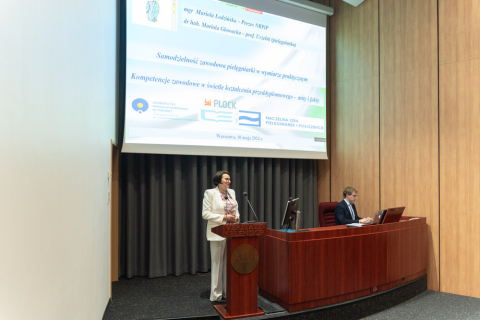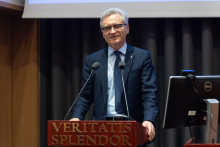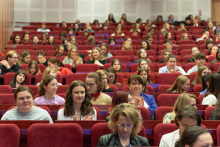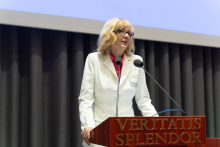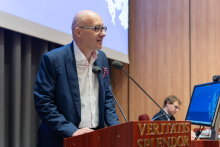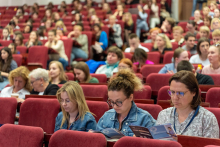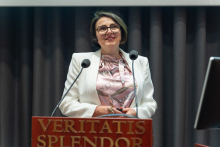The conference was conducted by Dr. Karolina Prasek from the Department of Basic Nursing MUW. In turn, the ceremonial opening was conducted by Prof. Zbigniew Gaciong, Rector of MUW.
- I see many young people here who are still learning nursing and midwifery - professions that are extremely necessary. We have learned that medicine is a team game and in a team everyone is important. We have different roles in this team, but the rank of each person is the same. Now we still have to learn to work together in interprofessional groups - the Rector said.
Prof. Gaciong also reminded that the Forum is connected with the Day of the Nurse and Midwife, which falls on May 12, and expressed his good wishes to all representatives of these professions.
Prof. Mariusz Gujski, Dean of the Faculty of Health Sciences MUW, also took up the thread of teamwork.
- Today, the time of soloists has passed and significant success is achieved through teamwork.
The dean also presented diplomas to the participants of the 14th Janina Fetlińska Nursing Olympiad.
Guests of the conference
Prof. Ursula Demkow, Undersecretary of State at the Ministry of Health, was a special guest at the Forum.
- My heart has always been on the side of nurses - the Undersecretary said - When I was a young doctor it was nurses who introduced me to the arcana of the profession. You are the pillars of the system and without you nothing would have happened in medicine. That's why at the Ministry we pay so much attention to ensuring that nurses can develop their professional competence.
Dr. Grażyna Wójcik, President of the Polish Nursing Association, also spoke about the biggest challenges.
- Today, the biggest challenge is the quality of education. We have more than 120 universities, and we are struggling to make sure that the newly established medical schools educate as well as the best ones. We also have to look at what is happening to the results of this education. We have, unfortunately, a lack of use of the skills and competencies obtained throughout the education process. We need to think about how to change this - the President of the Polish Nursing Association (PTP) stressed.
Independence - theory and practice
What the professional independence of nurses and midwives really consists of was pondered by the representatives of these professions themselves. Mariola Głowacka, MD, PhD, a nurse, University professor, Chairwoman of the National Accreditation Council for Schools of Nursing and Midwifery, reminded that the profession of nursing is an independent medical profession.
- Those with a bachelor's degree can write prescriptions for continuing treatment. Those with a master's degree can independently prescribe treatment and write referrals for certain diagnostic tests or medical devices - the speaker said.
At the same time, she stressed that independence is, above all, responsibility. Mariola Głowacka, MD, PhD, also spoke about professional competence in the light of pre-graduate education.
- Today, the biggest challenge is - how to build a message to make it attractive to a student from the “7 C” generation (connected, communicating, computerized, contetnt-centered, celebritized, community-oriented, clicking). People from this generation have trouble focusing on traditional textbooks, and they perfectly assimilate the text given in the form of short messages.
Mariola Głowacka, MD, PhD, pointed out what methods of education are most effective today. She also provided an overview of state-of-the-art equipment and methods used in patient care, including a Bluetooth-controlled wheelchair, health monitoring apps, the da Vinci robot, and a cardioverter with data transmission capabilities.
Dr. Monika Przestrzelska, Regional Consultant in Gynecological and Obstetrical Nursing, gave a lecture on the professional independence of midwives. The speaker began by citing the definition of the midwifery profession and quoting documents that talk about continuing postgraduate education. She also listed all the areas in which midwives have autonomy. And these include recognizing pregnancy and caring for a woman in physiological pregnancy, conducting physiological deliveries, receiving natural deliveries, including at home, examining newborns, infants and caring for them, educating and supporting a woman during lactation.
- At the moment, midwives can independently carry out their tasks as sole proprietors or group practices, and more and more women are coming to them - Dr. Przestrzelska said. - We have a lot of independence in caring for a woman during pregnancy, but we also want independence in caring for a woman later in life - the speaker stressed.
Professional competence - what is important
Dr. Beata Guzak, Director of the Center for Postgraduate Education of Nurses and Midwives, spoke about professional competence in the light of postgraduate education.
- What prevents nurses with a master's degree and a completed specialization from conducting detailed clinical assessments, making diagnoses and prescribing medications to patients? - wondered the speaker.
In doing so, she cited a discussion from Facebook. The starting point of this discussion was the questions: what is the essence of the nursing profession?, is there a need for a nurse with a stethoscope, prescribing medications, or rather a person who will take care of the patient and take the time? Many extreme opinions were raised. In the end, the quoted Facebook discussion was closed by the voice of a nurse from Ilinois, pointing out that what we in Poland are still discussing in the world has long since happened, and the nursing profession can perfectly combine many competencies: both prescribing medicines and empathetic care of the patient.
Independence in legal terms and beyond
The independence of nurses and midwives in the context of civil and professional liability was discussed by Anna Augustynowicz, MD, PhD, from the Department of Health Economics and Medical Law MUW. On the other hand, Zofia Sienkiewicz, MD, PhD, from the Department of Development of Nursing, Social and Medical Sciences MUW, presented the topic “Nurse leadership and economic strength of health care.” The opening session concluded with a presentation by Grażyna Bączek, MD, PhD, Head of the Department of Obstetrics and Gynecology Didactics MUW and Director of Nursing and Midwifery at Żelazna Medical Center. In her presentation, she pointed out what helps midwives in self-reliance, what hinders, and what is still needed. According to the speaker, the education system works well. What doesn't work is a health care system that doesn't recognize the competence of midwives, and legislation doesn't keep up with changes in the education system.
Debate and examples of good practice
The speech by Grażyna Bączek, MD, PhD, was the starting point for a discussion on the professional independence of nurses and midwives. The debate was moderated by Izabela Fornal, MA, from the Department of Basic Nursing MUW, and experts spoke about the role of nurses and midwives and their place in the health care system, as well as the opportunities and challenges related to their professional autonomy. The debate was attended by: Grażyna Wójcik, MD, PhD, President of the Polish Nursing Association; Grażyna Bączek, MD, PhD, Head of the Department of Obstetrics and Gynecology Didactics and Director of Nursing and Midwifery Żelazna Medical Center, Dr Karolina Prasek, Department of Basic Nursing MUW and Director of Nursing and Midwifery Development at Medicover, Katarzyna Kowalska, MA, President of the Association of Digital Nurses, Marika Kaczmarek, MA, National Association of Family Midwives, Emilia Ciastoń, President of SKN Zacznij od Podstaw MUW, Gabriel Pesta, President of STATMED Scientific Circle MUW, Oksana Stępień, President of Student Scientific Circle of Midwives MUW.
After the debate, the practitioners session began, during which examples of good practice in professional independence of nurses and midwives were presented. The speakers included:
- Dr Monika Tomaszewska, Director of the Department of Medical Strategy and Prevention, Lux Med - Primary nursing in practical terms;
- Dr Dorota Fryc, Individual Specialized Obstetric Practice - Management of physiological pregnancy by a midwife;
- Urszula Jakubowska, MA, coordinator of the Hospital Emergency Department - Nurse as a coordinator of the Hospital Emergency Department;
- Dr Mariola Pietrzak, Provincial Consultant in Family Nursing - Coordinated health care in Primary Health Care (POZ);
- Małgorzata Jadczak, MA, Lazarski University, Faculty of Medicine - Wound care in independent nursing practice;
- Magdalena Krauze, MA, “Well-Born” Association - Childbirth at home according to the Standard of Perinatal Care;
- Grzegorz Cichowlas, MA, Polish Society of Infusion Nursing - Professional independence in vascular access syndrome in practice;
- Michal Ruminski, MA, Home Hospice of the Congregation of Marian Fathers - Palliative care in nursing practice;
During the Forum, workshops were held concurrently with the practitioner session: Ultrasound-guided vascular accesses, Independent infection advice, Management of physiological pregnancy by a midwife, Use of ultrasound in midwifery practice, as well as Communication in the therapeutic team.
The Professional Independence of Nurses and Midwives Forum was held on 10/05/2024 in a hybrid format. Among the participants were students and lecturers from the Ivano-Frankivsk National Medical University in Ukraine.
